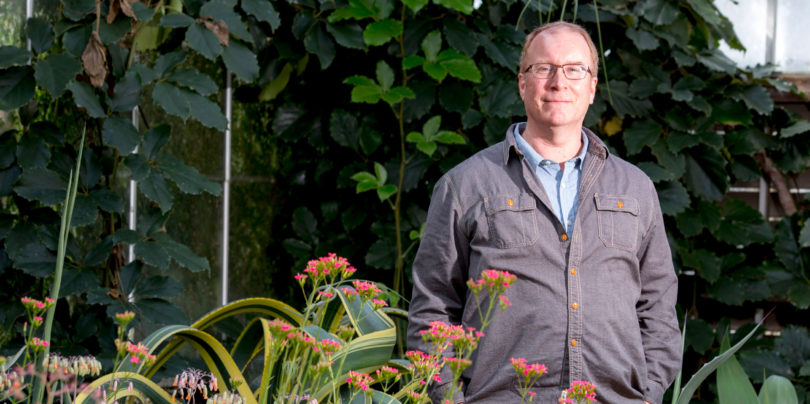Jim Leebens-Mack, a professor of plant biology in the Franklin College of Arts and Sciences, investigates the history of plant life on our planet and compares genome sequences to better understand the genetic basis of biological innovations that are of great practical importance for horticulture and agriculture.
Where did you earn degrees and what are your current responsibilities at UGA?
I earned my bachelor’s and master’s degrees in ecology and evolution from the University of Minnesota, and my doctorate in botany from the University of Texas. I am a professor in the department of plant biology in the Franklin College of Arts and Sciences and I teach courses in evolution, genomics and bioinformatics. I am also faculty director of the Georgia Genomics Facility.
When did you come to UGA and what brought you here?
This is my 10-year anniversary at UGA. I came here to interact with excellent colleagues doing research in the plant sciences and evolutionary biology. The University of Georgia has long been recognized as a leading research institution in both of these areas.
What are your favorite courses and why?
I regularly co-teach three courses—“Genome Evolution Across the Tree of Life” with Regents Professor Andrew Paterson, “Bioinformatics Applications” with University Professor Russell Malmberg and “Molecular Phylogenetics and Evolution” typically with Associate Professor Liang Liu. Phylogenetics is the study of evolutionary history through analysis of ancestor-descendent relationships among species. Some common themes in the courses I teach include collaborative learning and the utility of comparative analyses for understanding the evolution of biodiversity.
What interests you about your field?
Investigating the biological processes that have generated the breathtaking diversity of life on our planet is the most interesting and inspiring work I can imagine. At the same time, understanding evolutionary history is of great practical importance for horticulture and agriculture. In my lab we apply an evolutionary perspective to advance understanding of the molecular basis for variation in a wide range of fundamental processes, including flowering and fruiting, photosynthesis, water-use, storage root development, disease resistance, and the production of plant compounds with medicinal applications.
What are some highlights of your career at UGA?
I have been very fortunate to have excellent students, postdocs and research professionals working in my lab at UGA. To date, eight students have earned their doctoral degrees in my lab, and one student has earned a master’s degree. Helping these students frame and complete research projects that advance scientific knowledge has been extremely gratifying. Due to my students’ excellent work, my lab has earned some recognition for our research on the evolution of plant genomes and genes influencing plant growth and reproduction.
How does your research or scholarship inspire your teaching, and vice versa?
Most if not all of my course material is inspired by my research experience. At the same time, teaching helps me think about the big picture implications of my research.
What do you hope students gain from their classroom experience with you?
I hope my students complete my courses empowered with a new perspective on biodiversity and mastery of analytical tools to help them advance understanding of the processes that spawn biodiversity. Primary learning objectives for all of my courses include critical evaluation of information (i.e. data), formulation of questions about the ecological, genetic and molecular processes underlying patterns students may see in their data, and framing investigations that allow students to test their ideas.
Describe your ideal student.
Hmm, I don’t see much value in trying to define characteristics of the “ideal” student. Students come to UGA with various perspectives and academic strengths. It’s our job to cultivate insightful curiosity and help students develop strategies to pursue their interests in ways that advance knowledge and make the world a better place.
Favorite place to be/thing to do on campus is…
It’s hard to nail down favorites, but one thing I really enjoy is chatting with colleagues and students over coffee or an ice cream at the Creamery.
Beyond the UGA campus, I like to…
I love Athens! I enjoy taking advantage of the amazing local foodie and music scene we have here. At the same time, I love traveling. I am fascinated by cultural diversity and try to gain a glimpse of the places I visit through the historical and day-to-day experiences of locals. Just as I find here in Athens, I learn a lot listening to stories while sharing good food and libation.
Community/civic involvement includes….
I am a strong supporter of our local food producers and a member of two food co-ops. I am also a political junkie and do what I can to promote dialogue and understanding between friends and family members with differing political perspectives.
Favorite book/movie (and why)?
I generally like thought-provoking, somewhat offbeat books and movies. I am currently reading “Infinite Jest,” and I am a huge fan of Wes Anderson and Jim Jarmusch movies. I guess I like art that thoughtfully reflects on the human condition with wry humor and compassion.
Proudest moment at UGA?
I was very happy to receive the Creative Research Medal for comparative genomics research on the origin of flowering plants. However, my proudest moments center on my students’ accomplishments. Watching my students present the results of their dissertation research in our departmental seminars is very special.
(Originally published Oct. 23, 2016)







